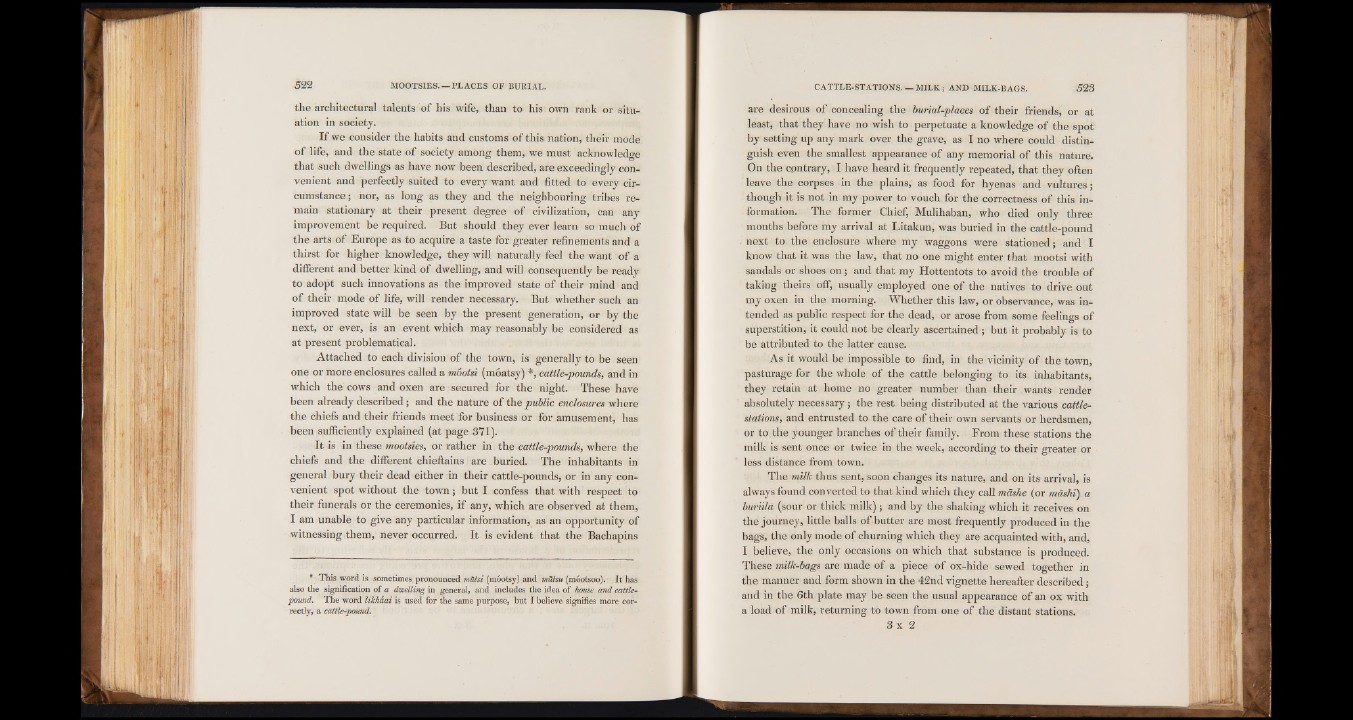
the architectural talents of his wife, than to his: own rank or situation
in society.
If we consider the habits and customs of this nation, their mode
of life, and the state of society among them, we must acknowledge
that such dwellings as have now been described, are exceedingly convenient
and perfectly suited to every want and fitted to every circumstance
; nor, as long as they and the neighbouring tribes remain
stationary at their present degree of civilization, can any
improvement be required. But should they ever learn so much of
the arts of Europe as to acquire a taste for greater refinements and a
thirst for higher knowledge, they will naturally feel the want of a
different and better kind of dwelling, and will consequently be ready
to adopt such innovations as the improved state of their mind and
of their mode of life, will render necessary. But whether such an
improved state will be seen by the present generation, or by the
next, or ever, is an event which may reasonably be considered as
at present problematical.
Attached to each division of the town, is generally to be seen
one or more enclosures called a mootsi (moatsy) *, cattle-pounds, and in
which the cows and oxen are secured for the night. These have
been already described; and the nature of the public enclosures where
the chiefs and their friends meet for business or for amusement, has
been sufficiently explained (at page 371).
It is in these mootsies, or rather in the cattle-pounds, where the
chiefs and the different chieftains are buried. The inhabitants in
general bury their dead either in their cattle-pounds, or in any convenient
spot without the town; but I confess that with respect to
their funerals or the ceremonies, if any, which are observed at them,
I am unable to give any particular information, as an opportunity of
witnessing them, never occurred. It is evident that the Bachapins
* This word is sometimes pronounced rnittsi (mootsy) and mOtsu (mootsoo). It has
also the signification of a dwelling in general, and includes the idea of house and cattle-
pound. The word likhaai is used for the same purpose, but I believe signifies more correctly,
a cattle-pound.
are desirous of concealing the burial-places of their friends, or at
least, that they have no wish to perpetuate a knowledge of the spot'
by setting up any mark over the grave, as I no where could distinguish
even the smallest appearance of any memorial of this nature.
On the cpntrary, I have heard it frequently repeated, that they often
leave the corpses in the plains, as food for hyenas and vultures;
though it is not in my power to vouch for the correctness of this information.
The former Chief,'Mulihaban, who died only three
months before my arrival at Litakun, was buried in the cattle-pound
next to the enclosure where my waggons were stationed; and I
know that it was the law, that no one might enter that mootsi with
sandals or shoes on; and that my Hottentots to avoid the trouble of
taking theirs off, usually employed one of the natives to drive out
my oxen in the morning. Whether this law, or observance, was intended
as public respect for the dead, or arose from some feelings of
superstition, it could not be clearly ascertained ; but it probably is to
be attributed to the latter cause.
As it would be impossible to find, in the vicinity of the town,
pasturage for the whole of the cattle belonging to its inhabitants,
they retain at home no greater number than their wants render
absolutely necessary; the rest being distributed at the various catlle-
stations, and entrusted to the care of their own servants or herdsmen,
or to the younger branches of their family. Erom these stations the
milk is sent once or twice in the week, according to their greater or
less distance from town.
The milk thus sent, soon changes its nature, and on its arrival, is
always found converted to that kind which they call mdshe (or mashi) a
buriila (sour or thick milk); and by the shaking which it receives on
the journey, little balls of butter are most frequently produced in the
bags, the only mode of churning which they are acquainted with, and,
I believe, the only occasions on which that substance is produced.
These millc-bags are made of a piece of ox-hide sewed together in
the manner and form shown in the 42nd vignette hereafter described;
and in the 6th plate may be seen the usual appearance of an ox with
a load of milk, returning to town from one of the distant stations.
3 x 2